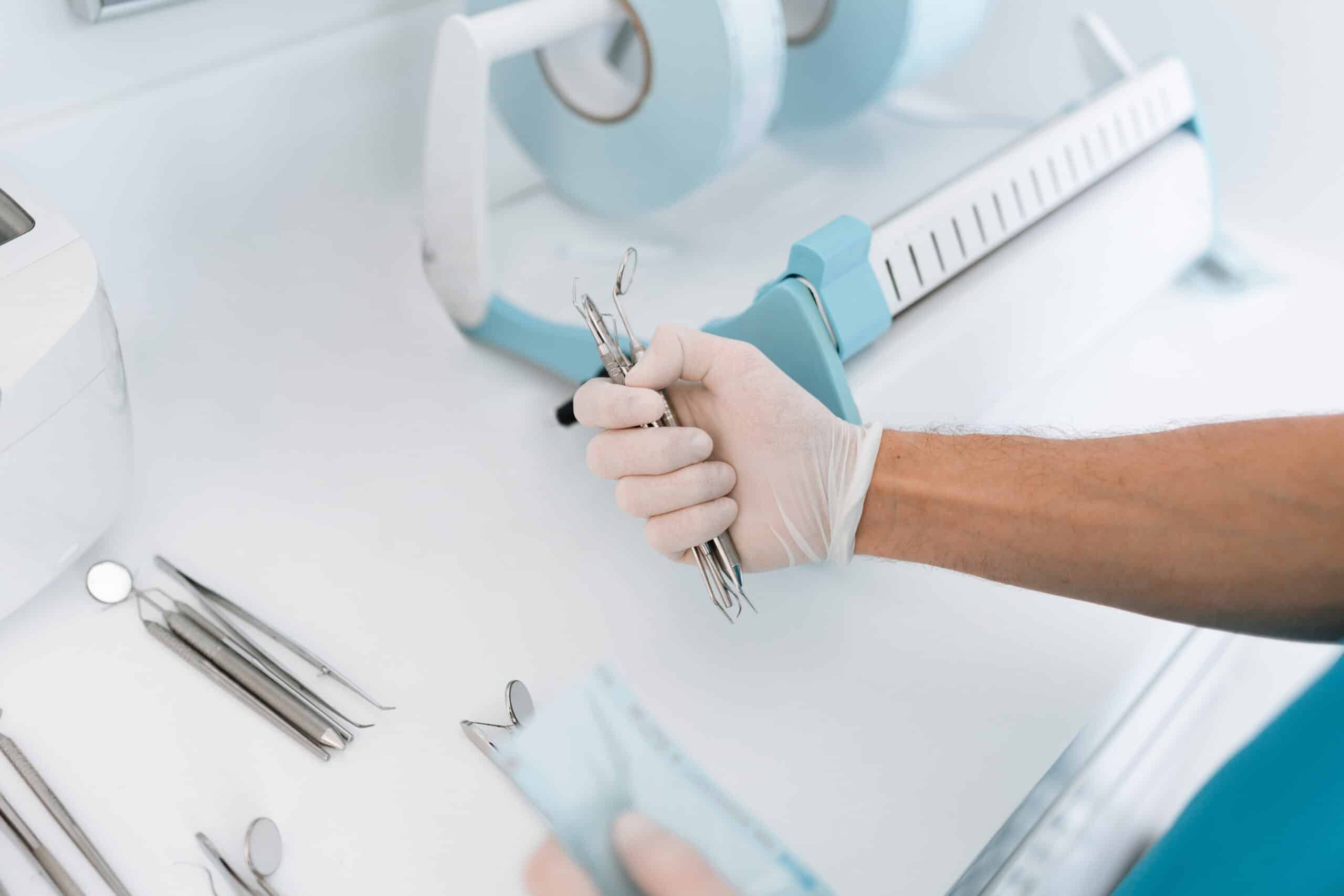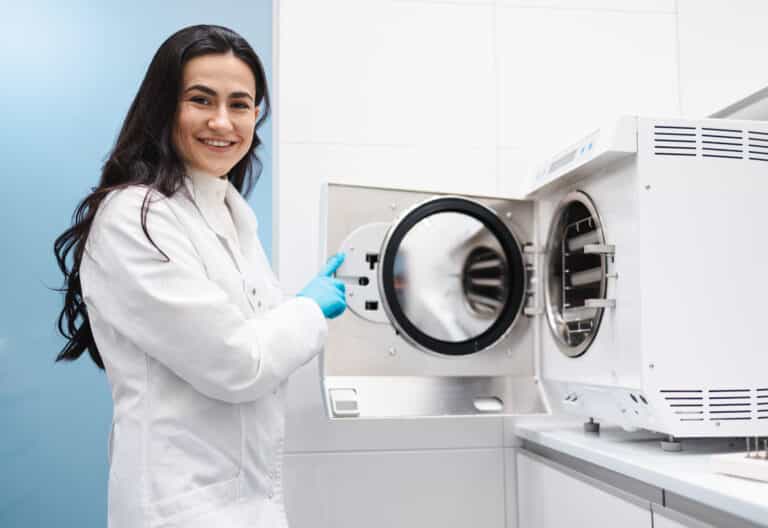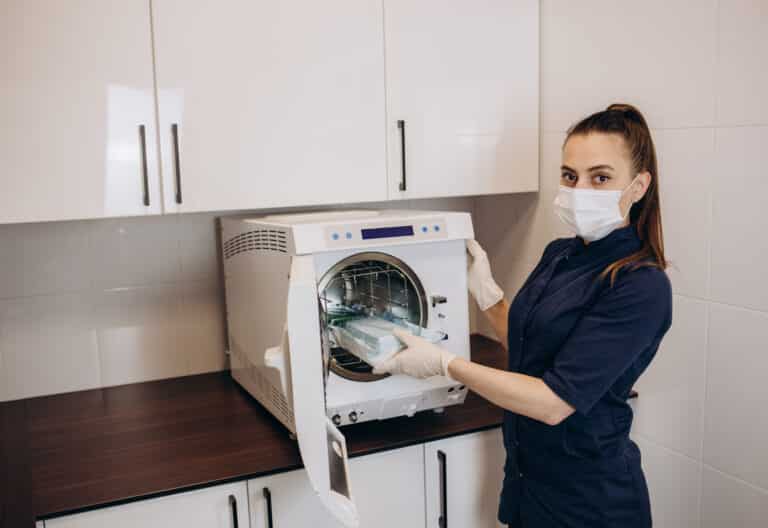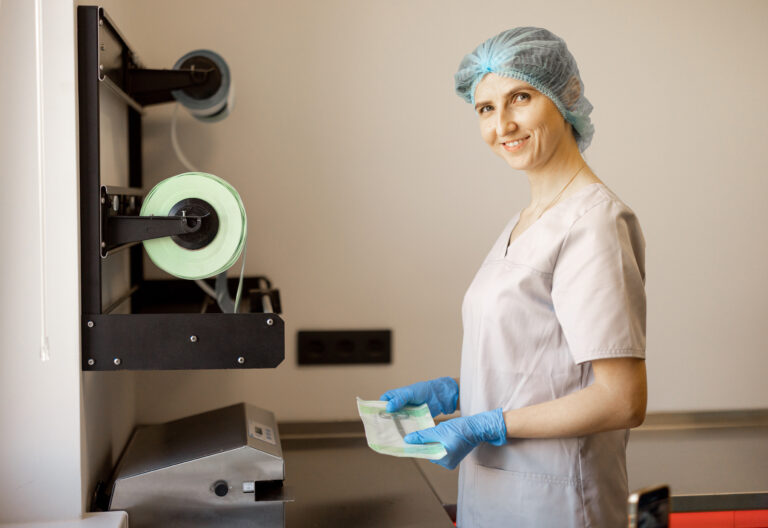In the field of sterile processing, obtaining certification is crucial for advancing your career and ensuring high standards of patient care.
The certified sterile processing technicians are the backbone of patient safety in a healthcare setting as they are responsible for cleaning, decontaminating, sterilizing, and handling medical instruments and equipment.
So, in this article, we will discuss what a certification is, the difference it holds against a certificate, the necessity to get certified, different certification options, the most popular option among Sterile Processing Technicians, and so on.
Plus, we’ll also share a program that helps you to become a certified Sterile Processing Technician faster in as little as 120 days.
So, let’s get started –
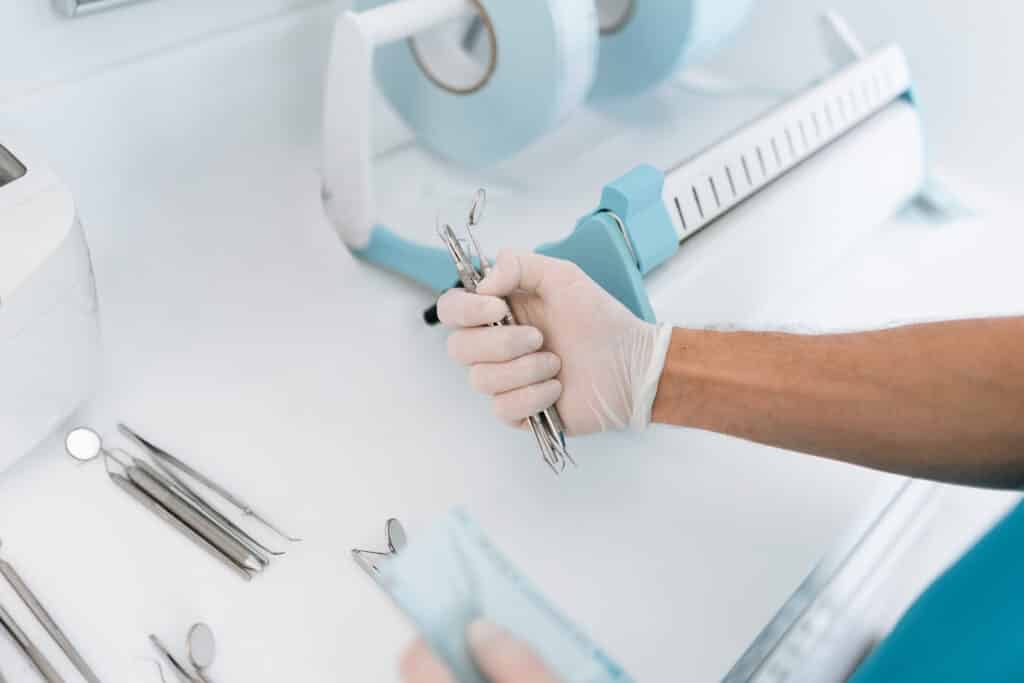
What is a Certification?
A certification for Sterile Processing Technicians is a professional credential that validates an individual’s competency and proficiency in sterile processing techniques and procedures.
This requires candidates to pass a standardized examination administered by a recognized certifying organization.
A certification demonstrates that a Sterile Processing Technician has met certain educational and experiential requirements and has successfully demonstrated their knowledge and skills in areas such as cleaning, decontamination, sterilization, and handling of medical instruments and equipment.
It signifies that the individual has attained a level of expertise recognized by industry standards and regulatory bodies.
Certification for Sterile Processing Technicians is often obtained through various institutions such as the HSPA (Healthcare Sterile Processing Association) or the Certification Board for Sterile Processing and Distribution (CBSPD).
These organizations establish the criteria for certification, develop the examination content, and oversee the certification process to ensure its validity and reliability.
Overall, a certification for Sterile Processing Technicians serves as a mark of professional achievement and proficiency, enhancing the credibility and career prospects of sterile processing technicians in the healthcare industry.
Read -> What is a Sterile Processing Technician?
Difference between a Certificate and a Certification
As discussed above, the certification is a professional credential that is awarded after passing a standardized exam administered by a recognized certifying body.
In contrast, a certificate is awarded upon completing a training program, such as a course or diploma, indicating that the individual has finished the required coursework.
This is earned after passing the final exam, and on successful completion of clinical hours of your training program.
Why getting certified is necessary?
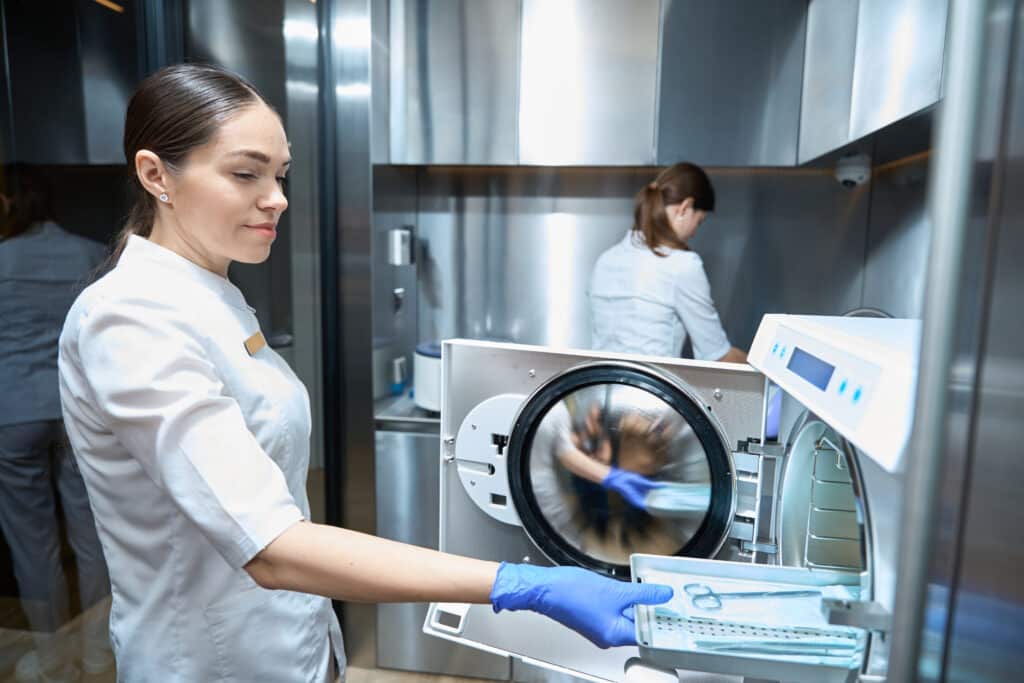
As a Sterile Processing Technician getting certified is necessary for several reasons, each contributing to the quality of patient care and professional advancement in the healthcare industry.
The reasons are as follows:
Ensuring Patient Safety
Certified Sterile Processing Technicians undergo rigorous training and examination processes to demonstrate their proficiency in sterile processing techniques.
By obtaining certification, they confirm their ability to properly clean, decontaminate, sterilize, and handle medical instruments and equipment, thereby reducing the risk of infections and ensuring the safety of patients undergoing medical procedures.
Meeting Regulatory Standards
Healthcare facilities are subject to strict regulatory standards and guidelines set forth by organizations such as the Centers for Disease Control and Prevention (CDC) and the Occupational Safety and Health Administration (OSHA).
Employing certified Sterile Processing Technicians helps facilities maintain compliance with these standards, reducing the risk of penalties and legal liabilities associated with non-compliance.
Enhancing Professional Credibility
Getting certified serves as a testament to a Sterile Processing Technician’s knowledge, skills, and dedication to their profession. It demonstrates their commitment to excellence and ongoing professional development, enhancing their credibility among colleagues, employers, and patients.
Expanding Career Opportunities
Many healthcare facilities prioritize hiring certified Sterile Processing Technicians due to their proven expertise and adherence to industry standards. Certification opens doors to a wider range of job opportunities, including positions in hospitals, surgical centers, clinics, and other healthcare settings. It may also lead to higher salaries and advancement within the field.
You May Also Like:
-> Sterile Processing Technician Salary
-> Sterile Processing Technician Resume
-> Sterile Processing Technician Job Description
What is a CRCST certification?
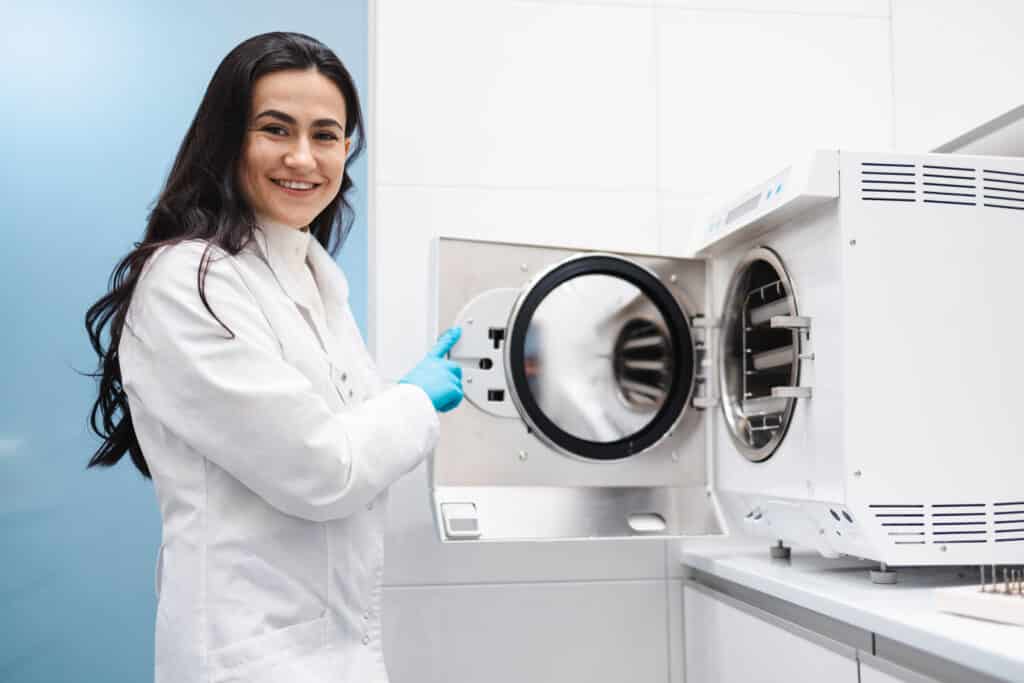
The Certified Registered Central Service Technician, CRCST is a certification program specifically designed for individuals aspiring to become competent Sterile Processing Technicians or for existing technicians seeking recognition for their skills and knowledge in the field.
The HSPA administers the program, this exam assesses candidates on various aspects of sterile processing to ensure they meet the necessary standards and competencies required for the role.
Exam topics include
- Cleaning, Decontamination & Disinfection
- Preparation & Packaging
- Sterilization Process
- Patient Care Equipment
- Sterile Storage & Inventory Management
- Documentation & Record Maintenance
- Customer Relations
CRCST Exam
It is a 3-hour long computer-based MCQ exam with 125 scored questions and 25 unscored pre-test questions. Now, for each scored question it holds 1 point.
Passing the Exam
To pass the CRCST exam, candidates must achieve a minimum passing score of 70%. Successful completion of this exam demonstrates the candidate’s readiness and competence to perform the duties of a Sterile Processing Technician effectively and safely within a healthcare facility.
Ultimately, this certification option is the most popular option among Sterile Processing Technicians nationwide. So, if you are looking to become a certified Sterile Processing Technician, CRSCT certification is what you should look to get.
Also Read:
-> Certified Sterile Processing Technician
-> Sterile Processing Technician Certification
How to Become a CRCST-certified Sterile Processing Technician Faster?
Becoming a CRCST-certified Sterile Processing Technician faster involves a streamlined approach to meeting the certification requirements and passing the necessary exam.
To become a CRCST-certified SPT faster, follow these steps:
Step 1 -> Meet Eligibility Requirements
Before you can become CRCST-certified, you must meet the eligibility criteria. This typically includes having a high school diploma or equivalent and some experience or education in sterile processing.
Step 2 -> Enroll in an Accredited Online Sterile Processing Technician Training Program
One of the most efficient ways to get the necessary education and training is to enroll in an accredited online SPT program. These programs are designed to provide comprehensive training in a flexible, self-paced format, allowing you to complete your studies more quickly than traditional in-person programs.
Step 3 -> Choose CRCST Certification and Prepare Well
Once enrolled in your training program, focus on preparing for the CRCST certification. Utilize the lessons from your online program and supplement your studies with additional resources such as textbooks, practice exams, and study guides. This will ensure you have a thorough understanding of the material.
Step 4 -> Register for the CRCST Exam on the HSPA Website
Visit the HSPA’s official website to register for the CRCST exam. Create an account if you don’t already have one and follow the instructions to sign up for the certification exam.
Step 5 -> Fill Out Details and Pay the Exam Fee
Complete the registration form with all necessary details and pay the exam fee, which is typically $125. Ensure all information is accurate to avoid any delays in your registration process.
Step 6 -> Schedule the Exam
After registering and paying the fee, schedule your exam by selecting a convenient date and time. The CRCST exam is offered at various testing centers, and some locations may offer the option to take the exam online.
Step 7 -> Take the Exam and Await Your Results
On the scheduled date, take the CRCST exam with confidence. After completing the exam, await your results, which will determine if you have successfully earned your certification.
By following these steps, you can efficiently become a CRCST-certified Sterile Processing Technician.
This structured approach ensures you meet all requirements and are well-prepared for the certification exam, enabling you to start your career faster and with confidence.
Now, you must be wondering, “I know all these steps, How can this help me to become a Certified Sterile Processing Technician Faster?”
Well, as I hinted out earlier, to become job-ready as a certified Sterile Processing Technician you need to enroll in an accredited, online, self-paced training program.
Read:
-> Sterile Processing Technician Requirements
-> How to Become a Sterile Processing Technician?
What else do you need in the training program?
Besides being accredited, 100% online, and self-paced, here are the things that your training program should provide you with –
#1 A university certificate after you finish your training program.
#2 They should make you ready for the CRCST Certification exam.
#3 You should get an externship placement at a local healthcare facility.
#4 The program should finish Faster in 6 to 8 months.
#5 It should be affordable.
If your program meets all these criteria then that’s the program you need to enroll in.
But what we have heard from many students is that finding those programs is a daunting task. So, here is a program that we feel could be the right choice for you to start your career as a Sterile Processing Technician –
Preppy’s Sterile Processing Technician Certification Training Program
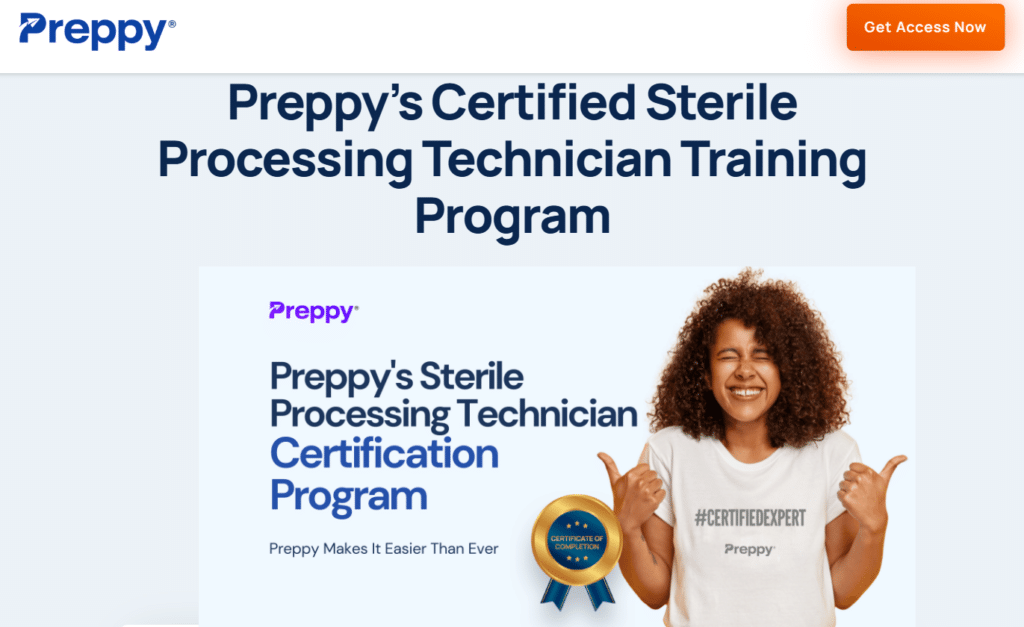
Preppy’s Sterile Processing Technician program is 100% online and self-paced.
After you finish the course, you get a university certificate of completion from a reputed, non-profit, 150-year-old University.
You become ready for the CRCST Certification exam.
Preppy helps you get an externship opportunity at a local healthcare facility close to where you live all over the US.
Since the program is self-paced most students finish the program in as little as 120 Days.
As of now, there’s a bonus offer where you get a free laptop and it’s yours to keep even after you’re done with the course.
Finally, you get Preppy’s Sterile Processing Technician certification training program in as little as $1599, and the cost is all-inclusive.
That’s insane!
So, if you want to become a CRCST-certified Sterile Processing Technician and want to start your career faster, then, enroll in Preppy’s Sterile Processing Technician Certification training program.
Also Read:
-> Sterile Processing Technician Training Course
-> Sterile Processing Technician Programs and Schools
-> Sterile Processing Technician Certificate Program Online
-> Sterile Processing Technician Training Program Cost
What does a CRCST-certified Sterile Processing Technician do?
A CRCST-certified Sterile Processing Technician plays a crucial role in maintaining the cleanliness, sterility, and availability of medical instruments and equipment in healthcare facilities.
Here are some of their key responsibilities:
Cleaning and Decontamination
They meticulously clean and decontaminate surgical instruments and equipment to remove any organic and inorganic residues, blood, tissue, and other contaminants. This process is essential for preventing the transmission of infections and ensuring patient safety.
Sterilization
They operate specialized sterilization equipment, such as autoclaves, to sterilize cleaned instruments and equipment. They follow strict protocols and guidelines to ensure that instruments are properly sterilized, eliminating any harmful microorganisms, including bacteria, viruses, and spores.
Instrument Assembly and Packaging
After sterilization, they assemble sterile instrument sets and packages according to specific procedures and guidelines. They ensure that instruments are properly arranged and packaged to maintain sterility and facilitate easy access during medical procedures.
Inventory Management
They are responsible for managing inventory levels of sterile supplies and instruments, including ordering, organizing, and restocking supplies as needed. They track inventory levels, monitor expiration dates, and ensure that healthcare providers have the necessary tools and equipment for patient care.
Quality Assurance
They participate in quality assurance activities, such as monitoring sterilization processes, conducting equipment maintenance and performance checks, and documenting sterilization and decontamination activities. They ensure compliance with regulatory standards and guidelines to maintain high standards of quality and safety.
Collaboration
They collaborate with other healthcare professionals, including surgeons, nurses, and central sterile supply staff, to ensure the timely delivery of sterile instruments and equipment for medical procedures. They communicate effectively with team members to address any concerns or issues related to sterile processing and instrument availability.
So, these are the duties of a certified sterile processing technician.
Read -> What Does a Sterile Processing Technician Do?
Conclusion
Certified Sterile Processing Technicians play a critical role in ensuring the safety and effectiveness of surgical procedures by maintaining the cleanliness and sterility of medical instruments and equipment.
We hope this article did enlighten you about the certification for Sterile Processing Technician, the types of certifications, the difference it holds against a certificate, the necessity to get certified, and much more.
Finally, if you want to become a certified Sterile Processing Technician faster in as little as 120 days, without student loans, or without driving to college, then enroll in Preppy’s Sterile Processing Technician Certification training program.
RELATED:
-> Sterile Processing Technician Exam
-> Travel Sterile Processing Technician
-> Sterile Processing Technician vs. Surgical Technologist
-> How Long Does it Take to Become a Sterile Processing Technician?
